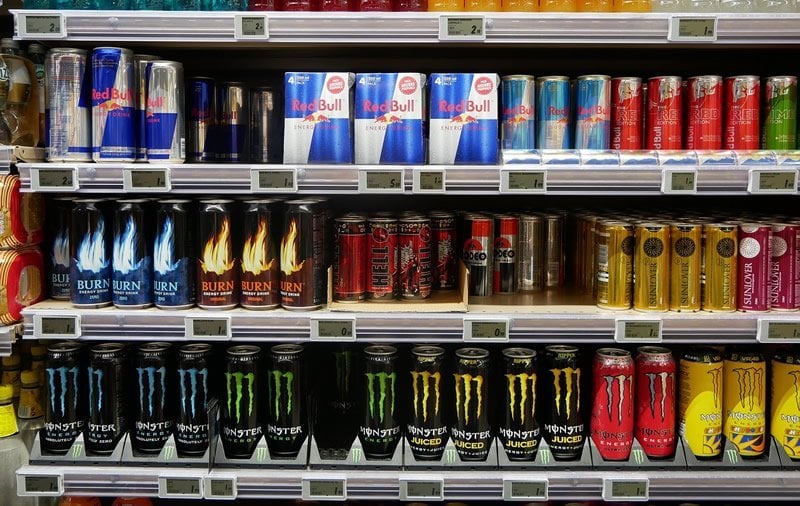Summary: Excessive consumption of energy drinks like Monster and Red Bull has been linked to serious general health and mental health problems. Researchers report cognitive incentive retraining can help curb cravings for energy drinks.
Source: Flinders University
Regular consumers of popular caffeinated energy drinks may need help kicking the habit.
New research at Flinders University in Australia, published in the international journal PLOS One, put a form of cognitive incentive retraining – a form of computer-based training aimed at reducing decision-making biases in purchasing energy drinks – to the test on more than 200 regular consumers of energy drinks aged between 18 and 25.
With the powerful marketing by brands such as Red Bull, V, Mother and Monster, the Australian Research Council-funded research is focusing on finding ways to reduce or combat the rising levels of energy and soft drink consumption.
The training aimed to reduce energy drink consumption by either reducing the extent to which energy drink cans capture the attention of regular energy drink consumers (attentional bias) or reducing the tendency for these consumers to approach energy drinks (approach bias).
“We are keen to expand these trial methods on consumers to combat through their attentional and approach bias towards energy drinks,” says Mind, Body and Cognition research leader Professor of Psychology Eva Kemps.
“By giving participants some simple techniques, we examined whether they were prepared to moderate their bias toward choosing energy drinks over soft drinks and more healthy options, and perhaps reduce consumption before they become addicted.”
While an occasional energy drink is not problematic, it has been reported that some individuals consume four or more energy drinks a day. Excessive intake can lead to the development of intolerance and serious withdrawal symptoms upon cessation.
Energy drink consumption is rising, with one estimate of it doubling in the past 10-15 years to more than 11.5 billion liters a year globally, with a majority of consumers young adults.
Side-effects of excessive intake of the high caffeine drinks, with other stimulants taurine, guarana and ginseng, can lead to a range of negative physical and mental health consequences, including anxiety, depression, or even stress PTSD and substance abuse.
Reported adverse effects range in severity from headaches to heart palpitations, renal failure, seizures, and in rare cases death.

The 226 volunteers in the study – many of them university students – said they consumed 1 or more cans a fortnight, for an energy boost, to relieve fatigue, improve sporting or academic performance, or as a party mixer with alcohol.
The training aimed to reduce energy drink consumption by tackling either the extent to which the products capture the attention of regular energy drink consumers (attentional bias) or the tendency for these consumers to approach energy drinks (approach bias).
Attentional and approach biases have been demonstrated for a range of appetitive substances, including alcohol, tobacco, drugs and chocolate.
The research is part of an ARC Discovery Project (2018-21) looking at the role of automatic processing in the (over)consumption of soft drinks, and follows previous attentional retraining research to reduce food cravings and promote healthier eating and weight loss.
Source:
Flinders University
Media Contacts:
Eva Kemps – Flinders University
Image Source:
The image is in the public domain.
Original Research: Open access
“‘Cognitive bias modification for energy drink cues”. E Kemps, M Tiggemann, M Cibich and A Cabala.
PLOS ONE doi:10.1371/journal.pone.0226387.
Abstract
‘Cognitive bias modification for energy drink cues
Energy drink consumption is increasing worldwide, especially among young adults, and has been associated with physical and mental health problems. In two experiments, we tested the prediction that energy drink consumption is in part driven by biased cognitive processing (attentional and approach biases), with a view to modifying these to reduce consumption. Young adults (18–25 years) who regularly consume energy drinks completed the dot probe (Exp.1; N = 116) or approach-avoidance task (Exp.2; N = 110) to measure attentional and approach bias for energy drink cues, respectively. They then underwent a cognitive bias modification protocol where they were trained to direct their attention away from pictures of energy drink cans (Exp.1), or to push a joystick away from themselves in response to these pictures (Exp.2). Following a post-training assessment of attentional (Exp.1) or approach bias (Exp.2), energy drink consumption was measured by an ostensible taste test. Regular energy drink consumers showed both an attentional and an approach bias for energy drink cues. Cognitive bias modification successfully reduced both biases. However, neither attentional nor approach bias modification significantly reduced energy drink intake. The results lend some support to incentive sensitisation theory which emphasises the role of biased decision-making processes related to addictive behaviours.






